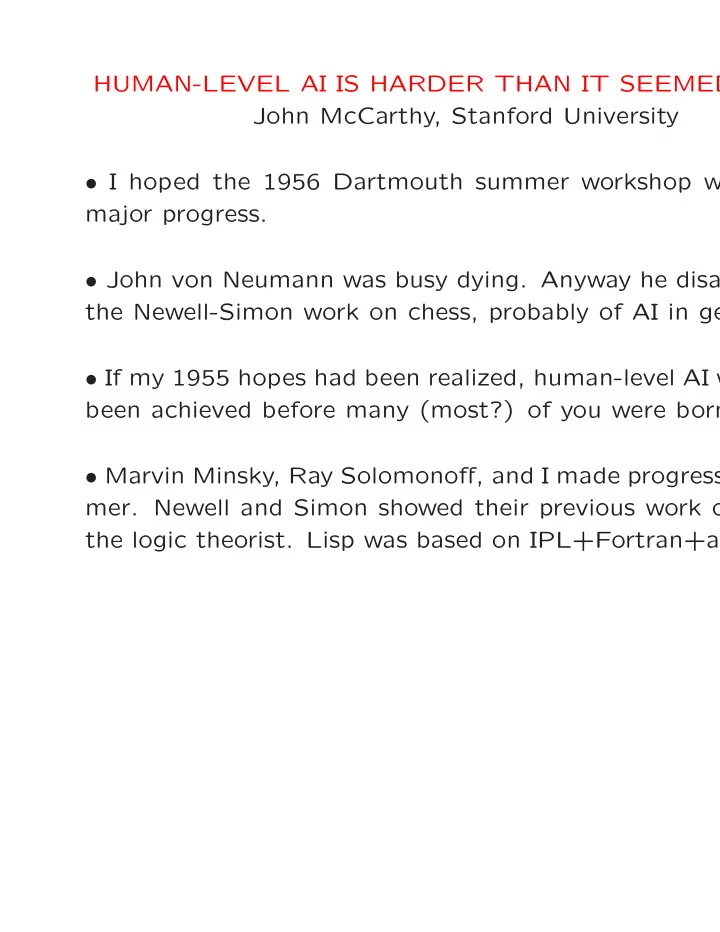

HUMAN-LEVEL AI IS HARDER THAN IT SEEMED John McCarthy, Stanford University • I hoped the 1956 Dartmouth summer workshop w major progress. • John von Neumann was busy dying. Anyway he disap the Newell-Simon work on chess, probably of AI in ge • If my 1955 hopes had been realized, human-level AI w been achieved before many (most?) of you were born • Marvin Minsky, Ray Solomonoff, and I made progress mer. Newell and Simon showed their previous work o the logic theorist. Lisp was based on IPL+Fortran+ab
AI is OK—mostly • Chess programs catch some of the human chess playin but rely on the limited effective branching of the chess The ideas that work for chess are inadequate for go. • alpha-beta pruning characterizes human play, but it ticed by early chess programmers—Turing, Shannon, Ulam, and Bernstein. We humans are not very good a ing the heuristics we ourselves use. Approximations to a used by Samuel, Newell and Simon, McCarthy. Prov lent to minimax by Hart and Levine, independently b Knuth gives details. • Theorem proving—Newell-Simon, Boyer-Moore, reso solvers for propositional calculus.
• Logical AI, reduced logical AI in various forms. • CYC • RKB?, Semantic web? • DARPA car race but it could be better.
OBSTACLES • One’s time estimates are based on the obstacles on • My 1958 “Programs with common sense” made p (promises?) that no-one has yet fulfilled. • That paper proposed that theorem proving and probl programs should reason about their own methods. unsuccessfully. Unification goes in the wrong direction • There has been considerable progress in logical A enough.
BAD IDEAS—alias my prejudices • Basing machine learning on linear discriminations. • Basing ontology on hierarchies of unary predicates mantic networks. • Basing theorem proving on resolution. Getting statem clausal form throws away information. • Entering knowledge without logic (RKF). • Also: XML (They should have used Lisp lists), Te committee science
EXCUSES • We aren’t smart enough. An Einstein might have do • They didn’t give us enough money. Not the main p • It was 100 years from Mendel to the genetic code. • Inadequate idea, e.g. GPS (general problem solver) • The neural net people aren’t there either. • Too much grabbing for what could be applied in term. The call for this symposium exhibits that fault.
COMMITTEE SCIENCE • “This formula E = mc 2 is all very well, Herr Einste don’t see it increasing the German GDP in the next 1 20 years. Develop some applications and then subm proposal.” • “We are forming a committee on theory and appli co-ordinate transformations. We suggest, Herr Eins you contact the chairman of the committee.” • I was treated to a talk this morning that emphasized funders want. That’s not the path to scientific prog it wasn’t even clear that the funders know what the hope NSF stays out of these committee science con
concentrates on proposals from individuals. Compute and especially AI, seems particularly afflicted with c science.
WHITHER? • Provers that reason about their methods. • Adapt mathematical logic to express common sens tinuing problem.
COMMON SENSE IN MATHEMATICAL LOGIC—m • Example formula (not a whole theory): Cblocks : ( ∀ x l s )( Clear ( x, s ) ∧ Clear ( l, s ) → Location ( x, M • Problems: Non-monotonic reasoning Contexts Approximate objects and theories If the above explanation is perfectly clear, you don’t ne a course in logical AI.
• People who put knowledge into computers need ma logic, including quantifiers, as much as engineers need Alas, logic for freshman isn’t developed beyond pro calculus.
Recommend
More recommend